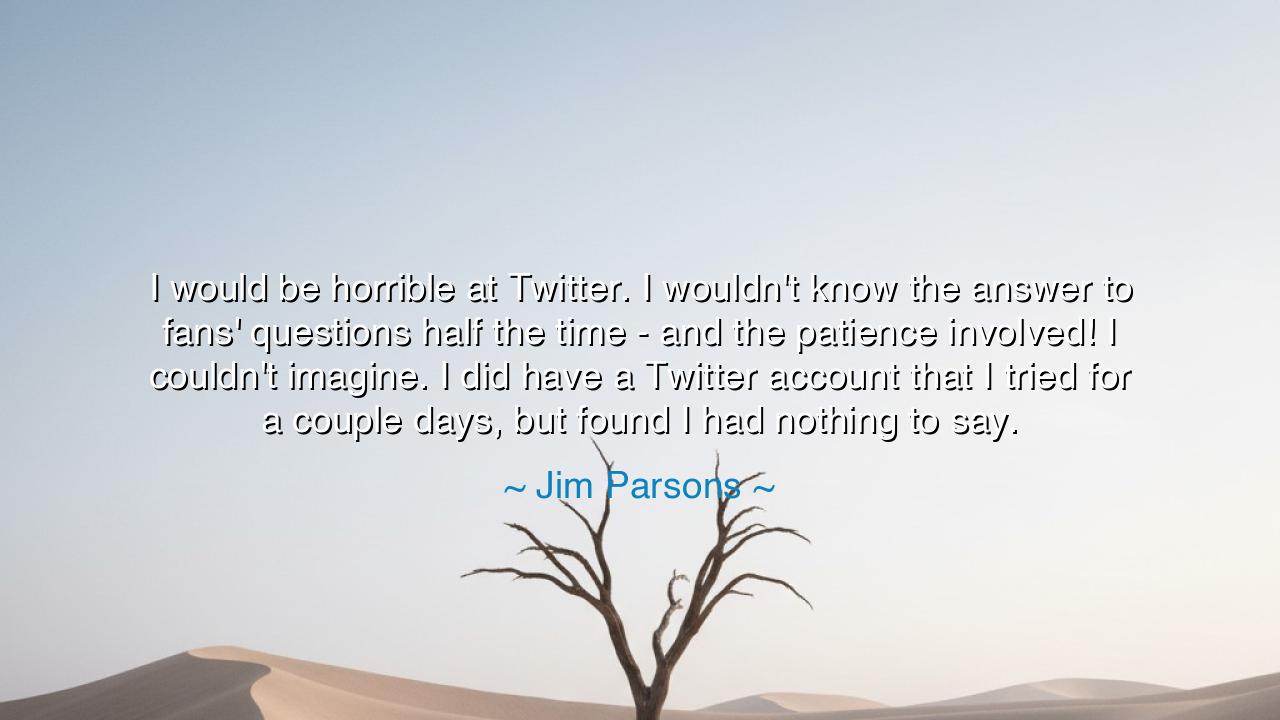
I would be horrible at Twitter. I wouldn't know the answer to
I would be horrible at Twitter. I wouldn't know the answer to fans' questions half the time - and the patience involved! I couldn't imagine. I did have a Twitter account that I tried for a couple days, but found I had nothing to say.






Jim Parsons, with honesty both tender and sharp, once declared: “I would be horrible at Twitter. I wouldn’t know the answer to fans’ questions half the time—and the patience involved! I couldn’t imagine. I did have a Twitter account that I tried for a couple days, but found I had nothing to say.” Though he spoke with humility, his words carry the weight of a lesson that transcends the world of celebrity. They are a meditation on silence, on the limits of constant communication, and on the courage it takes to resist the endless demands of modern voices calling out for attention.
In the ancient world, not every voice sought to be heard at every moment. The wise spoke when wisdom was needed, and the poets sang when the occasion called. But today, Twitter and its kin summon us to ceaseless speech, to constant declaration, to an endless stream of words, whether we have something to say or not. Parsons confesses what many feel but few admit: that to speak without meaning is emptiness, and to answer without knowledge is folly. Thus, his rejection of Twitter is not weakness, but a recognition of truth—that not every silence needs to be filled, and not every question requires a reply.
The ancients would nod at his confession. Recall the story of Socrates, who declared that true wisdom lies in knowing that one does not know. How often was he questioned in the Athenian marketplace, pressed for answers to life’s riddles! And yet he never claimed mastery of all things. He endured the discomfort of admitting ignorance, for he understood that false answers, offered for the sake of appearances, corrode the soul. Parsons, in his own way, follows this same path: he admits that he “wouldn’t know the answer half the time,” and in this humility, we find the spark of wisdom.
Yet he also speaks of patience, that rare and heavy virtue. The demands of thousands, the questions of strangers, the expectation of immediate response—these are burdens not easily borne. Even kings of old, surrounded by courtiers, sought solitude to escape the endless noise of petitioners. The human soul was not fashioned for constant interruption. To lack the patience for such a world is not failure; it is an acknowledgment of human limits. Parsons shows us that it is better to guard one’s peace than to drown in the river of unending demands.
History gives us another lesson in restraint: Marcus Aurelius, emperor of Rome, wielded power over millions, yet in his private writings—later known as Meditations—he confessed exhaustion at the clamor of voices around him. He turned inward, seeking stillness, choosing carefully when to speak and when to act. His restraint, like Parsons’s rejection of constant posting, was not a lack of courage, but a conscious discipline. Both men remind us that the world’s noise can drown out the inner voice, unless we choose silence and selectivity.
Parsons’s final admission, “I found I had nothing to say,” is perhaps the most profound. For in a culture that prizes endless commentary, he dares to admit that silence can be more honest than empty chatter. This humility is rare. To say “I have nothing to say” is not to confess emptiness, but to respect the sacredness of speech. The ancients believed words were seeds: each one carried weight, each one bore fruit. To scatter them carelessly was to dishonor their power. Parsons, by withholding his words, honors them all the more.
So, dear listener, let this teaching be written upon your heart: do not force yourself to speak when you have nothing worth saying. Guard your words, for they are treasures. Do not bow to the tyranny of constant commentary, nor exhaust yourself in endless answers. Instead, practice humility, embrace silence, and wait until what you have to offer is true, necessary, and kind. For in the end, wisdom is not measured by the quantity of speech, but by its quality. Parsons’s confession is not weakness—it is strength, reminding us that sometimes the greatest voice is the voice that knows when to remain still.






AAdministratorAdministrator
Welcome, honored guests. Please leave a comment, we will respond soon